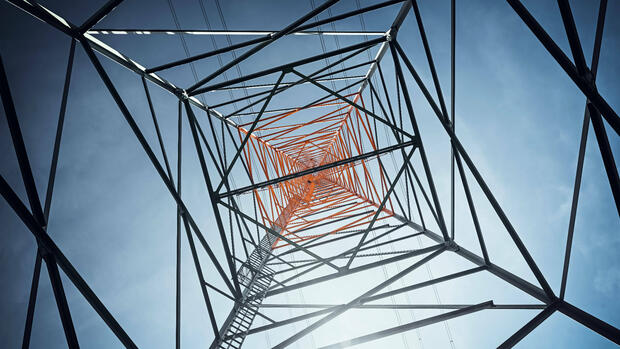The energy transition requires massive investments in the German power grid.
(Photo: IMAGO/Christian Ohde)
Dusseldorf The transmission system operator Amprion is once again giving the all-clear for the power grid in view of the German nuclear phase-out next Saturday. At a presentation of his annual report on Thursday, Amprion boss Hans-Jürgen Brick said: “We are finding that even with the phase-out of nuclear energy, we will have a comparable level of stability as last year.”
There was no question of a blackout risk last winter. Only temporary load shedding was conceivable, and then only in the extremely unlikely event. Brick went on to say: “The measures that have now been initiated will also mean that we will have a comparable level of system security in the coming winter as we did last year.” Such measures include agreements with industry or a higher utilization of the net.
Amprion invested around 1.5 billion euros in network expansion in the past financial year. That is 15 percent more than in the previous year. According to Amprion, investments thus reached a new record. Amprion intends to invest around 22 billion euros in the transmission grid over the next five years.
Amprion boss: “We are currently realizing more projects than ever before”
The massive investments are necessary to manage the energy transition: Electricity is playing an increasingly important role in the energy supply in Germany. Brick said on Thursday: “A new phase of the energy transition is beginning, in which we are increasingly moving from planning to implementation. We are currently realizing more projects than ever before.” The acceleration initiated by the federal government is showing its first effects, meaning that Amprion can implement important projects earlier than originally planned.
In its coalition agreement, the federal government has given special priority to the expansion of renewable energies. They are now considered to be of “overriding public interest” and should therefore tend to be given preferential treatment in conflicts with environmentalists, for example.
According to Amprion, it received approvals for more than 200 kilometers of line in the 2022 financial year and was able to complete 115 kilometers of line. That too is more than ever. The number of employees also increased by 8.5 percent. Amprion intends to hire 400 more employees in the current year.
Amprion’s sales increased by 36.6 percent year-on-year to around 3.5 billion euros. Revenues from the network business, Amprion’s core business, increased by 18.6 percent to around 2.1 billion euros.
In view of the high investments required by network operators like Amprion, the question arises again and again as to whether Amprion needs new or additional owners who will bring new equity into the company. Amprion is currently mostly owned by financial investors from the insurance industry and pension funds; 25.1 percent are with the energy company RWE. In contrast to other transmission system operators, the state has so far been left out at Amprion.
Brick declined to comment on the issue on Thursday, citing that ownership issues should be “placed where they belong”. There are only talks with the federal government at the operator level, and they only deal with topics such as the climate neutrality law and accelerated network expansion.
More: Electricity grid operator Tennet sees an investment requirement of 111 billion euros
